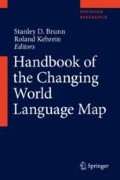Abstract
Religious criticism is usually associated with Western atheist religious criticism (Feuerbach, Marx, Nietzsche, and Freud). This approach, rooted in modernity, is closely linked to the scientific and rational worldview of the Enlightenment. Based on its binary approach, Western atheist religious criticism defines itself in opposition to religion, which, from this perspective, is sometimes reduced to premodern or even fundamentalist religious profiles.
The aim of this chapter is to show how a different approach to religious criticism rooted in a constructive postmodern theory and method (discourse analysis) can help provide a discerning pathway in the many facetted map of religious positions. From the point of view of religious education, this approach offers a new way to teach religion, which meets the demands of a globalized world. The goal is to help students develop worldview literacy. This skill enables students to juggle religious and nonreligious worldviews from a neutral position. Because religious education in Denmark is a mandatory subject in high schools and, by law, non-confessional, this way of communicating religious criticism as discernment rather than judgment helps students engage in this subject from a perspective that invites curiosity and empathy instead of defensiveness or aggression. In a world where it is no longer possible to remain isolated within one’s own religious position, worldview literacy is a skill that may help further a dialogue not only between religious worldviews but also between religious and nonreligious worldviews. The chapter presents pedagogical strategies and tools for developing this approach to religious education. The movie The Sound of Music is used as an example of how to help students develop worldview literacy in order to prepare them for entering the arena of present-day conflicting worldviews, where the themes of religion and dogma, religion and gender, and religion and science have been singled out. Finally, the academic benefits of this approach to religious education will be addressed.
Access this chapter
Tax calculation will be finalised at checkout
Purchases are for personal use only
References
Abe, Maso. (1997). Zen and comparative studies (ed. Steven Heine). Honolulu: University of Hawaii Press.
Barbour, I. G. (1990). Religion in an age of science. London: SCM Press.
Bateman, A., & Fonagy, P. (2010). Mentalization based treatment for borderline personality disorder. World Psychiatry, 9(1), 11–15. https://www.ncbi.nlm.nih.gov/pmc/articles/PMC2816926/.
Enger, D. (2013). Religionskritik. Latvia: Systime.
Enger, D. The hills are still alive – The Sound of Music fylder 50 år. Berlingske Tidende, December 17, 2015.
Enger, D. (2016). Perspectives of religious criticism – The challenge of globalization. Viborg: Systime.
Fairclough, N. (2004). Analysing discourse. Textual analysis for social research (2003). London: Routledge.
Graf, F. W. (2014). Götter Global. Wie die Welt zum Supermarkt der Religionen wird. München: C.H. Beck Verlag.
Luhmann, N. (2013). A systems theory of religion. Stanford: Stanford University Press. Originally published in German as Die Religion der Gesellschaft, Frankfurt: Suhrkamp, 2000.
Moore, S. (2007). Overcoming religious illiteracy. A cultural studies approach to the study of religion in secondary education. New York: Palgrave Macmillan.
Newberg, A., & Waldman, M. R. (2012). Words can change your brain. New York: Penguin.
Merriam-Webster (2018). Retrieved: May 7 http://www.learnersdictionary.com/definition/literacy
Schlitz, M., Vieten, C., Miller, E., Homer, K., Peterson, K., & Erickson-Freeman, K. (2011). The worldview literacy project: exploring new capacities for the 21st century student. New Horizons for Learning, 9(1). Retrieved: 30 Apr 2018 from http://jhepp.library.jhu.edu/ojs/index.php/newhorizons/article/view/37/35.
Sorensen, K. M. (2014). Ideologies and discourses: language, power, politics [Ideologier og diskurser: sprog, magt, poltik]. Copenhagen: Columbus.
Wilber, K. (1995). Sex, ecology, spirituality. Boston: Shambhala.
Author information
Authors and Affiliations
Corresponding author
Editor information
Editors and Affiliations
Rights and permissions
Copyright information
© 2020 Springer Nature Switzerland AG
About this entry
Cite this entry
Enger, D. (2020). Redefining Religious Criticism for Development of Worldview Literacy in Religious Education. In: Brunn, S., Kehrein, R. (eds) Handbook of the Changing World Language Map. Springer, Cham. https://doi.org/10.1007/978-3-030-02438-3_118
Download citation
DOI: https://doi.org/10.1007/978-3-030-02438-3_118
Published:
Publisher Name: Springer, Cham
Print ISBN: 978-3-030-02437-6
Online ISBN: 978-3-030-02438-3
eBook Packages: Social SciencesReference Module Humanities and Social SciencesReference Module Business, Economics and Social Sciences

